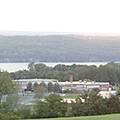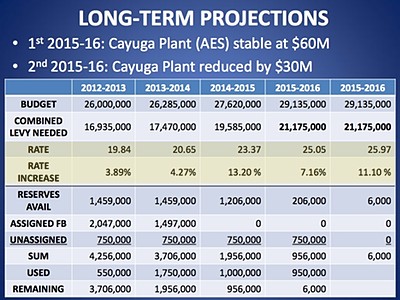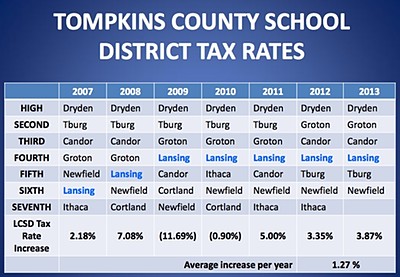- By Dan Veaner
- News
 Print
Print  There has been a lot of talk over the past few years about the impact of the devaluation of the Cayuga Power Plant on local taxpayers. As electricity from plants not powered by coal became cheaper a PILOT (Payment In Lieu Of Taxes) contract that would have valued the plant at $255 million this year was renegotiated in 2010 step its value down to a low of $60 million in the 2014-2015 school year. That drop could cost individual taxpayers thousands in additional taxes over the next four years.
There has been a lot of talk over the past few years about the impact of the devaluation of the Cayuga Power Plant on local taxpayers. As electricity from plants not powered by coal became cheaper a PILOT (Payment In Lieu Of Taxes) contract that would have valued the plant at $255 million this year was renegotiated in 2010 step its value down to a low of $60 million in the 2014-2015 school year. That drop could cost individual taxpayers thousands in additional taxes over the next four years.Last year the Lansing school tax rate rose 3.89%. About three percent of that was due to decreased power plant revenues. If next year's tax rate rises 4.21% the owner of a $200,000 property will pay $315 more next year. Two weeks ago School Business Administrator Mary June King presented the Board Of Education with a scenario that could raise the tax rate by 4.27% this summer, then a startling jump to 13.20% more in the 2014-15 school year, and somewhere between 7.16% and 11.10% the following year.
"In most school districts when they talk about the percentage of the rate increase it's identical to the percentage of the levy increase," King says. "But that's not true here, because of the PILOTs being such a huge amount of our combined levy. That skews it."
While these numbers are flexible depending on how reserves are allocated in a particular year, the cumulative effect would be the same for taxpayers. Worse, reserves could be depleted by the 2016-17 school year. And with items like employee benefits estimated to 'stabilize' at annual rises of around 25%, more and more money is needed just to maintain the program the schools have now.
 Rising tax rates and dwindling reserves pose a problem for Lansing taxpayers
Rising tax rates and dwindling reserves pose a problem for Lansing taxpayersLansing school taxpayers have dodged this bullet in the past several years because the district has underspent its budget several years in a row. This allowed the district to roll savings into the next year's budget, preventing the need to drastically raid reserves.
The power plant is still the district's largest taxpayer, and with the combination of the plant's plummeting value, uncertainty about its future, and cuts in state and federal aid, conservative budgeting and under-spending have not been enough to make up the gap.
Even with personnel and other budget cuts and efficiencies, the school board started their deliberations on next year's budget with a $3 million gap between expected revenues and a $26,285,000 budget that simply keeps things as they are without adding new programs or personnel.
"The bulk of the increase for the last several years has just filled the gap from the PILOT," King says. "But it hasn't taken care of the increase in our budget needs. We've been doing that with reserves and cutting."
Since november King has been asking the school board to tell her what tax rate they would be comfortable presenting for a vote this May. The board has not given her an answer, so in December she projected between a 4% and 5% tax rate rise, around 4.26%. With the power plant reaching a low of $60 million the following year, King estimates a 13.20% tax rate rise. That is after using $1 million from reserves to keep the tax rate that low. It would mean approximately $1,000 in additional taxes for a $200,000 home.
The next year there would be $956,000 in reserves. If the plant stays at $60 million the tax rate would rise 7.16% if all remaining reserves are applied. If the plant were to go down further to $30 million the tax rate would rise 11.10% After that reserves would be gone, which would mean higher tax rises in future years because the school board would have no resources left to lower the rate.
Lansing Supervisor Kathy Miller said Wednesday that the $30 million scenario is not unlikely. She said the plant has applied to convert from coal to gas, and the cost of doing so would mean reduced revenue for the plant and the loss of jobs because fewer workers are needed to operate a gas-powered plant. That could justify further reductions in the plant's value as its owners negotiate a future PILOT agreement adjustment with the Tompkins County Industrial Development Agency (IDA).
Pettograsso continues a plan of 'right-sizing' the district that former Superintendent Stephen Grimm began, justifying the number of teachers for each grade by enrollment.
"Steve was the right man for the right job for the time he was here," King says. "He led the charge, saying let's take an honest look at our numbers. Do we have sufficient numbers of students signing up for those classes to warrant that teacher being there? If we hadn't done that we would have spent out our reserves like some of those other districts."
"If the PILOT for the Cayuga Power Plant had gone up to $255 million as it was originally designed, our property tax would be capped at less than 2%," King remarks. "We would actually be able to collect less."
Acting Superintendent Chris Pettograsso and King are taking an active role in trying to restore lost revenue sources. Pettograsso is lobbying in Albany for the restoration of lost state school aid, and King is a member of the Town Of Lansing's Economic Development Committee. Both officials are looking closely at the sewer and town center proposals for their potential to attract developments that will increase the tax base. With more taxpayers to share the burden, the amount each has to pay goes down.
That has provided some savings. A major examination of bus routes provided the district significant savings in the past two years. King says any saving, no matter how small, is worth pursuing.
"When I can upgrade something by ten bucks I get excited," she says. "It's crazy, but it's true, because it's another ten bucks toward my goal."
 Keeping Lansing tax rate increases in perspective, King notes the average over four years has only been 1.27%, and Lansing falls smack in the middle of local school districts
Keeping Lansing tax rate increases in perspective, King notes the average over four years has only been 1.27%, and Lansing falls smack in the middle of local school districtsEven in the most optimistic scenario, which would see current projects in various stages of planning that could total about 400 new units plus new projects in the town center realized over the next few years, it won't be soon enough to lower the tax rate rises in the short run. Many of the new projects would be subject to new PILOTs. While the district would not lose value in these properties, they would contractually step up to full value over a seven to ten year period.
"It depends on how those PILOTs are designed," King says. "The Tompkins County IDA has been trying to assign a fair assessed value to those properties and creating the PILOT based on that. If that's the case it's not necessarily that the PILOT reduces the value of that property for taxpaying purposes. It just assigns a value they can project on for their business planning and I can project on for our tax planning."
The higher, eventual value in the PILOT is supposed to be the fair market value for that property. That means that taxpayers might begin to notice some relief after five or so years, but the next half dozen years are going to be tough.
King points out that Lansing's school tax rate increases have typically fallen in the middle range of tax rate increases county-wide. In a chart tracking the seven highest tax rate increases over seven years, Dryden has consistently had the highest rate increases. From 2007 through 2011 Trumansburg was second highest until Groton took that spot in 2012 and 2013. Lansing had the sixth highest in 2007 and fifth highest in 2008. Since then Lansing has had the fourth highest tax rate increases (fourth lowest), smack in the middle of the chart.
King says she does not believe a school district can go bankrupt, but when a district can't afford to pay for its programs she says a district's program is bankrupted. If that were to happen she says it would negatively impact Lansing's entire economy.
"In Lansing location and the school district are the two big tickets. We're near Cornell. We're near Borg Warner, and we've got a great school district," she says. "As soon as we start slicing and dicing our program are people going to be as enthusiastic about buying homes in Lansing? Are the values of the homes going to be the same? Will people develop the equity in their homes?"
If the tax rate does rise in double digits a year from May, the school board will be saddled with a political problem they may not be able to solve. But King has a history of budgeting and spending conservatively. While the 2013-2014 budget is currently estimated at $26,285,000 King said this week she is hoping the principals will come back with numbers that will lower that total. The real numbers may not be as bleak as they now look.
"I trust that my numbers are such that they look far uglier than they will really be. But I feel obligated to project the most conservative scenario I can when we're thinking about strategically planning our future steps."
Charts provided by Mary June King, LCSD. For full presentation click here.
v9i9



